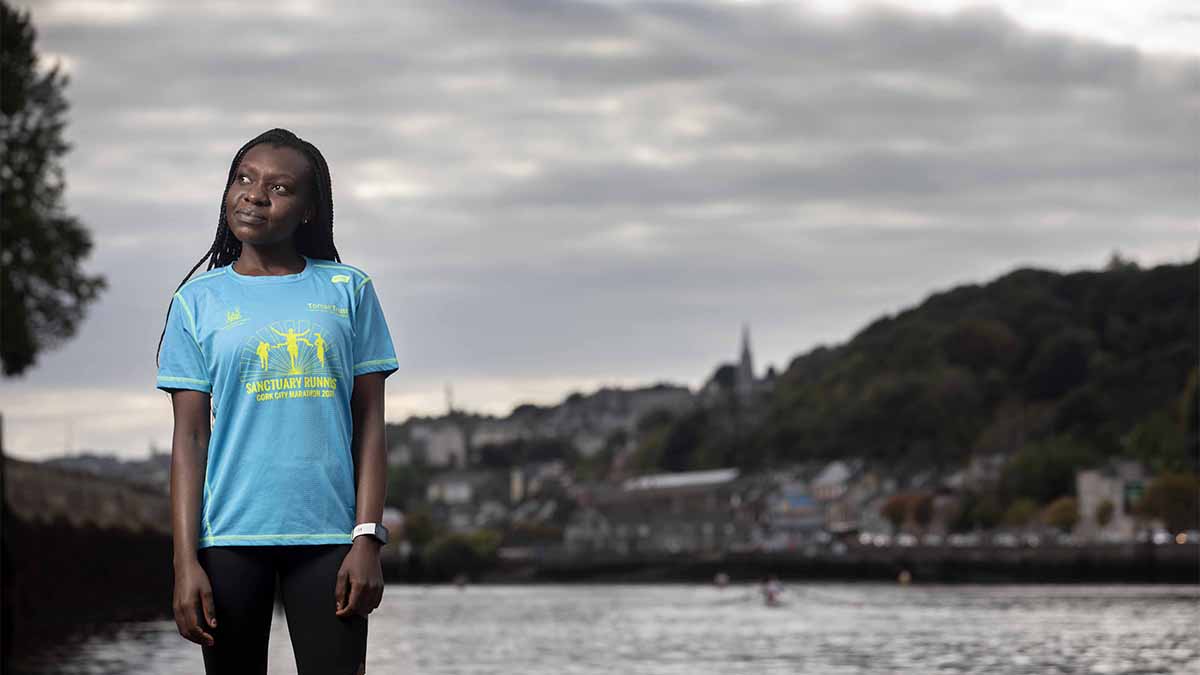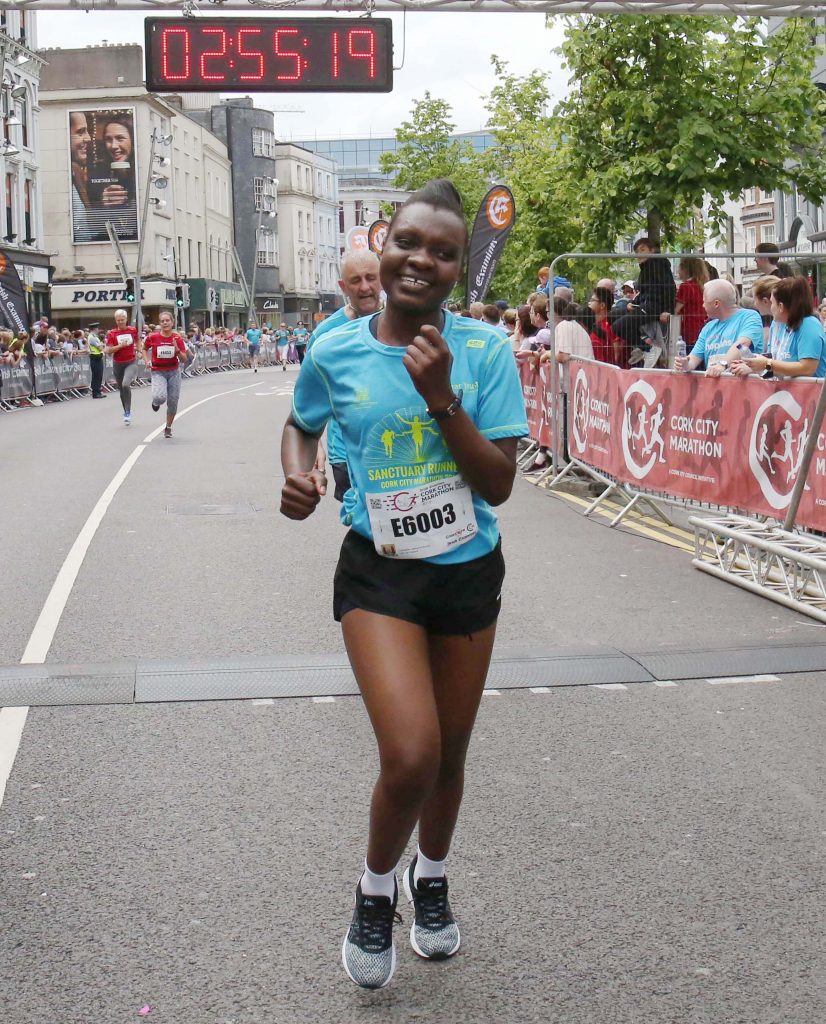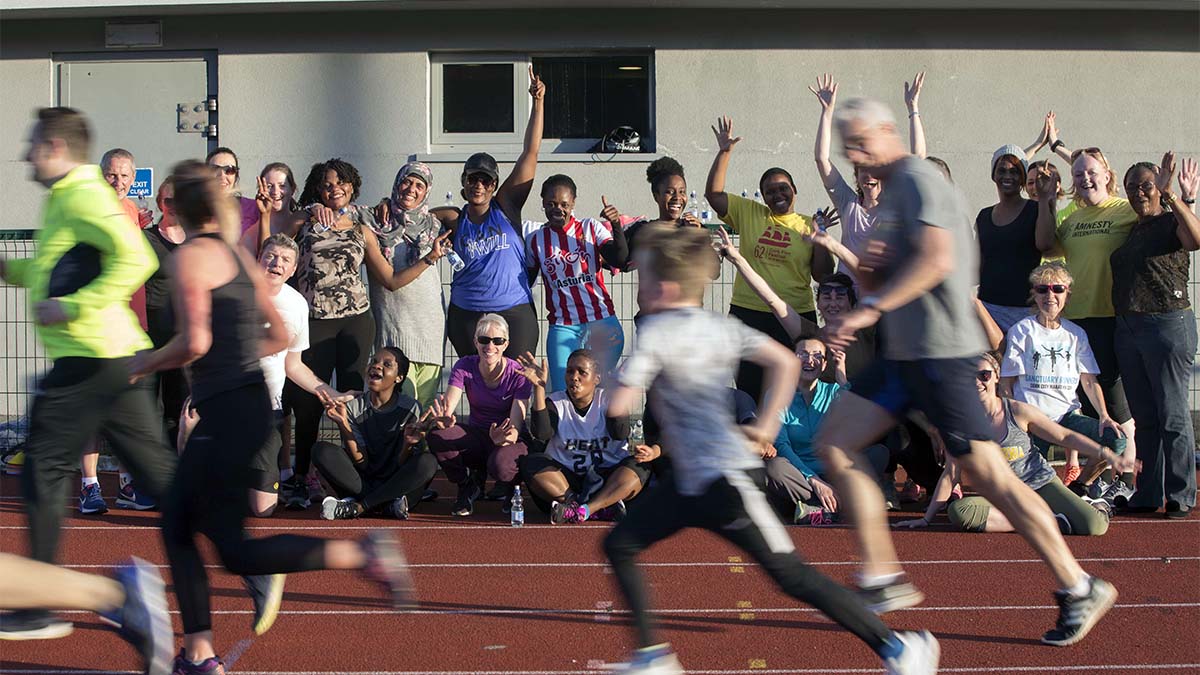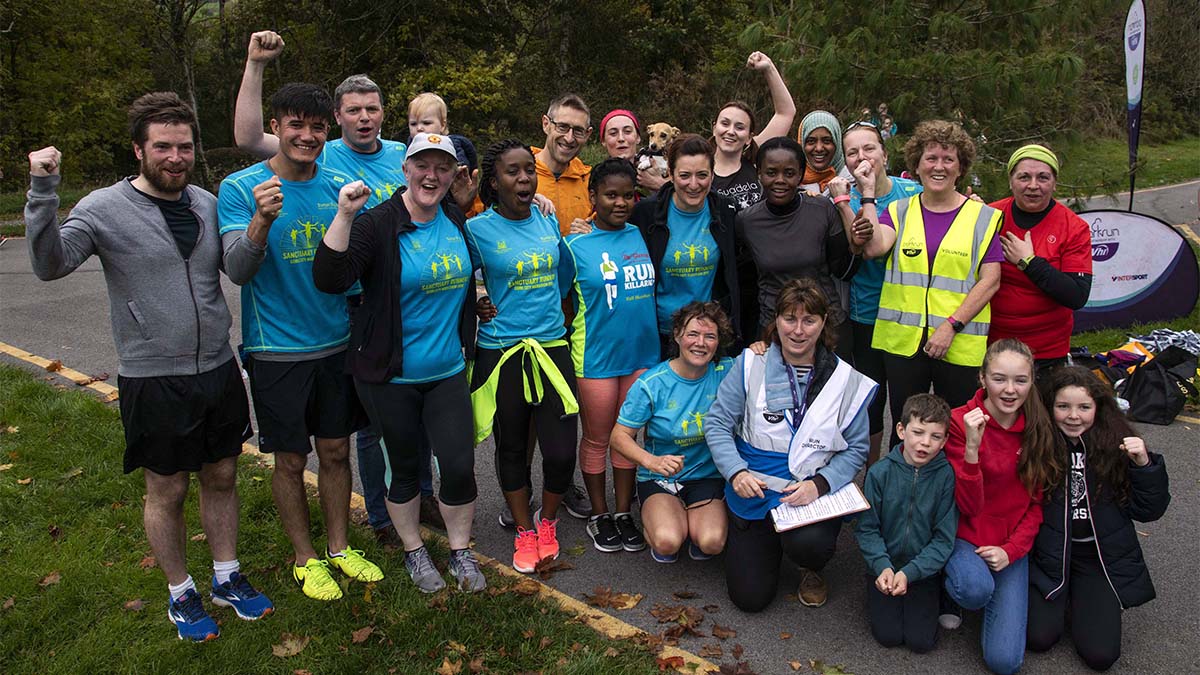Running club helps those seeking sanctuary find community

Sibusisiwe Busie Mhlophe of Cork Sanctuary Runners pictured at the Marina Cork City Centre near where she runs with her club Togher AC.
(Photo courtesy Clare Keogh)
When Sibusisiwe “Busie” Mhlophe arrived in Ireland from Zimbabwe, she felt isolated and anxious.

“I didn’t know anyone or have family anywhere in Europe. It was so depressing staying in the room the whole day with nothing to do,” she said.
She didn’t picture herself running in road races with new Irish friends, but that’s what happened after she decided to go for a run with a group called the Sanctuary Runners.
“I joined the Sanctuary Runners because that was the only opportunity for me to get out of the hostel, meet with people and interact with the Irish community.”
Mhlophe discovered a running talent she didn’t know she had. She was a netball player in high school in Gwanda, Zimbabwe, but not a runner. Now, she has run a few half marathons and hopes to run a full marathon next. Running also lowered her high blood pressure.
“(Running) makes me believe in life again, it keeps me going, and it relieves my stress,” she said.
Through Sanctuary Runners, Irish locals are lacing up their running shoes and hitting the streets along with refugees and asylum seekers. They get to know each other as people — fellow human beings out for a run and maybe grabbing a cup of coffee together afterward — and shed whatever preconceived notions they might have had about each other.

When immigration gets covered in the news, it’s often negative, said Graham Clifford, a journalist who established the Sanctuary Runners with photographer Clare Keogh in Cork in February 2018.
“I wanted to say, ‘to hell with that,’ Clifford said. “I want to see powerful, strong, proud, beautiful, unique individuals running alongside each other.”
Clifford had spent time reporting from refugee camps in northern Africa and had covered issues related to asylum seekers in Ireland. He started running a few years ago, and in the middle of a 10-mile race early last year, “the idea kind of came to me of putting the two things together—the running, and creating a bridge between people in everyday Irish society and asylum seekers and refugees,” he said.
In Ireland and other countries that host refugees and asylum seekers, the locals often don’t know how they might go about sitting down and chatting with one of them, he explained.
“I wanted to show that it was very easy,” he said.
In the past year, the group has grown to include about 750 people across Cork, Dublin, Limerick, Kerry, Waterford and Galway. Clifford expects to reach 1,000 members soon.
“In Ireland, people are slow to start things, but fast to roll in behind things,” he said.
In the Cork City Marathon in June 2018, the Sanctuary Runners team included 200 people, representing 40 nationalities.
First, the Sanctuary Runners gained the support of the Cork City Council.
“They saw the merits in it. It ticked a lot of boxes: social inclusion, diversity and healthy city,” Clifford said.
The model is simple: Volunteers run the program. Irish citizens (those living permanently in Ireland), refugees and asylum seekers of various running abilities sign up and receive a blue running top. They run together regularly, and they race together if they want to. They recruit participants living in direct provision, the system that houses asylum seekers in Ireland as they await a decision about their asylum application.
People sometimes wait in direct provision for years, and “it can be pretty miserable,” Clifford said. “One of the biggest challenges was to convince people in the direct provision centers to do this.”
For someone focused on gaining asylum or refugee status, running might be the last thing they want to do, he explained. But the volunteers and participants persuade people to come along on one run, “and we kept it lighthearted and good fun, and they told others, and soon, very quickly, it spread.”
Some of the participants from direct provision were skeptical at first.
“They saw that we weren’t in it for anything other than showing solidarity. Then they really flocked to it,” Clifford said. “They saw that this was fun — and this was probably the first time since they came to Europe that a group of people were treating them as human beings first, and not asylum seekers or refugees first.”
The Sanctuary Runners is not a charity — they accept donations to cover the running tops, but they do not fundraise. If runners need gear other than the running top, the group turns to local running clubs for donated shoes and clothes.
“The whole point is that it is not about charity, and it’s not about sympathy, and it’s not about pity — it’s about equality and humanity and solidarity,” Clifford said.
Why running and not some other activity to bring people together?
“It’s a great equalizer,” Clifford said. “We’re all equal when we’re running shoulder to shoulder.”
And if someone’s motivating you to finish a race, you don’t care about their legal status or any other difference between you and them, Clifford said.
Also, running is universal.

“Running is running — there isn’t an Afghanistan type of running and a Peruvian type of running and an Irish type of running,” Clifford said. “It’s the same across the world — it’s one foot in front of the other.”
Exercise yields several mental and physical benefits, especially for people who have been displaced from their homes and have suffered trauma. Once some of the direct provision participants started running, “they would come back and say, ‘Actually, I’m sleeping a lot better, my blood pressure is down, I’m much more motivated to take up a course or something, and I’ve more energy, so I can get out of bed,’” Clifford said.
Many of the Sanctuary Runners — both from Ireland and from direct provision — are new to running. Of the direct provision runners, men from sub-Saharan African countries are typically the only ones who have run before. Speed is not the group’s focus, but some Sanctuary Runners have surprised themselves with their running progress, and they keep clocking personal bests.
Mhlophe is one of them. She has joined another running club, Togher Athletics Club, and they have become family to her.
“I came to Ireland with no family at all, but now if anybody would ask me about it, I’d say, ‘Oh, yes, I have a family,’” she said. “I feel so very welcome in Ireland, and I never thought running can be so sociable.”
Sanctuary Runners run in local park runs — casual neighborhood runs — as well as more structured 10 kilometers, 10-mile races, half marathons and marathons, which some runners enter as relay teams. Residents pay entry fees, but race organizers offer free entry to runners from direct provision. The group has about 10 races planned in the next few months.
Races can give participants an extra boost of support. In the Cork City Marathon, “the crowd started to understand what we were doing, and they were roaring on their support,” Clifford said. “The Sanctuary Runners were going, ‘That’s for me!’”
“You know that feeling when you finish — that elation that you can’t describe — sharing that with somebody else on a regular, repeated basis just builds up a kind of trust,” Clifford said. “It’s very hard to emulate that in another way. There’s something very natural about it.”
Running offers a relaxed setting for a conversation, and people tend to open up, Clifford said. However, “sometimes there’s a real beauty in running in silence beside somebody. The solidarity is in the sound of the footsteps, rather than in the sound of the voice.”
Clifford emphasized the idea of equality, because it empowers everyone involved. For the asylum seeker or refugee, “it says I’m treating you as human being, I’m not pitying you, and I understand you have a temporary legal status, and that will change at some point. This is just a small window in your life.”
For Irish residents, he said, it shows they “have the ability to make a difference with somebody who’s in the migration system — it doesn’t need to be the government or the state. They can, just being themselves, bring positivity to the life of somebody who’s going through a difficult time.”
The Irish participants bring along their friends from all walks of life. Many of them probably wouldn’t normally get involved in working with asylum seekers or refugees — “maybe because it’s a bit political,” or they’re suspicious of asylum seekers, Clifford said.
But, when they see that the program is simply focused on solidarity and running, that apprehension fades.
“It’s a safe way to dip your toes — just come for a run,” Clifford said. “They don’t have to sign a membership form or anything.”
And negative stereotypes go both ways.
“I used to hear negative things about Irish people, but as soon as I got involved with Sanctuary Runners, I learned that what I heard is not true,” Mhlophe said. “I got to know Irish people, and they got to know me as well.”
She added that some of them didn’t know anything about direct provision until they asked her about it, and she explained what the system is like.
Mhlophe pointed out that people seeking refuge in Ireland also bring different talents with them.
“They can do things for the community as well.”
She volunteers with the charity Feed Cork, packing food for the homeless.

Clifford points to Irish history as an example of why a person’s legal status shouldn’t define them. In the mid-1800s, more than a million Irish people left, fleeing famine.
“They were refugees,” Clifford said. “This was five minutes ago in history, really. That didn’t define us, and nor should what’s happening now define the people of Syria or Iraq or wherever.”
Clifford hopes the Sanctuary Runners model will be replicated elsewhere. So far, the organization has received inquiries from people in San Diego, the United Kingdom and Italy.
“It changed my life,” Mhlophe said.
She recently met a man in the dining hall who had come from Zimbabwe a few months earlier, and she recognized in him the way she felt initially. She persuaded him to join the Sanctuary Runners, and after he did, “he found his smile back on his face,” she said. “I want to spread the word to everyone I meet.”
Allison Torres Burtka is a freelance writer and editor based in metro Detroit. You can read more of her work here.
Related Articles
Navajo ultra distance runner honors the Long Walk by retracing history step by step
'Forrest Stump's' 1,500 miles a small step to advocate for better athletic prothesis access
Soccer Without Borders builds bridges for refugee children
How Soccer Without Borders is helping young female footballers in Nicaragua


